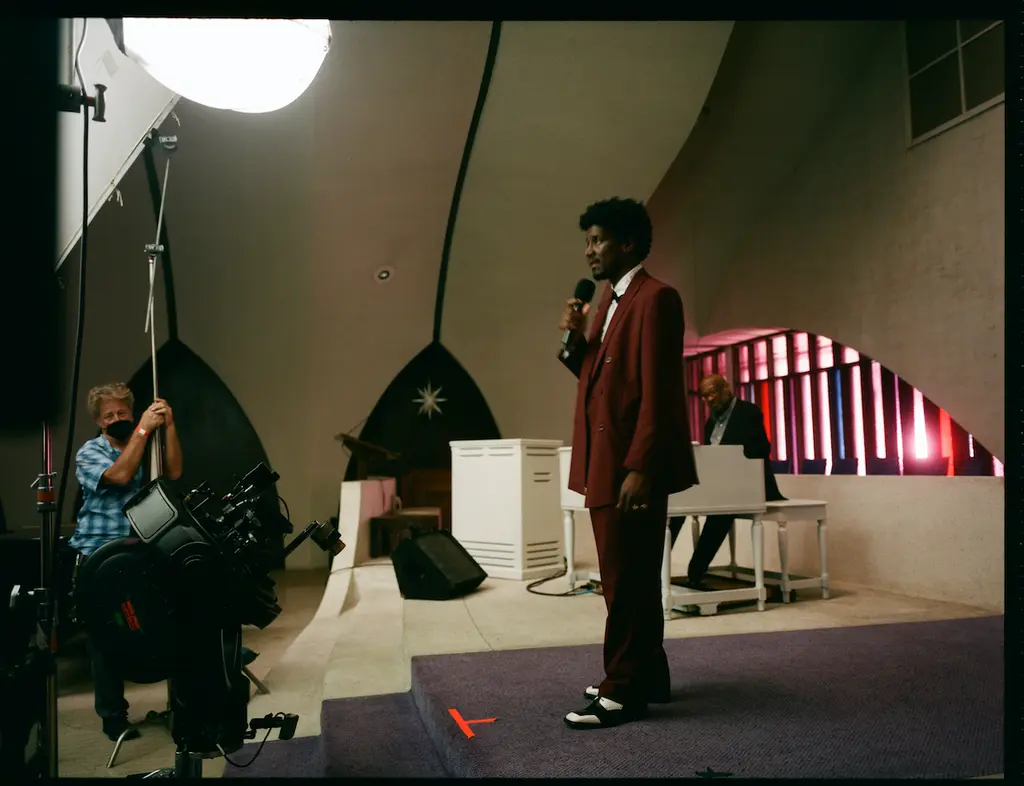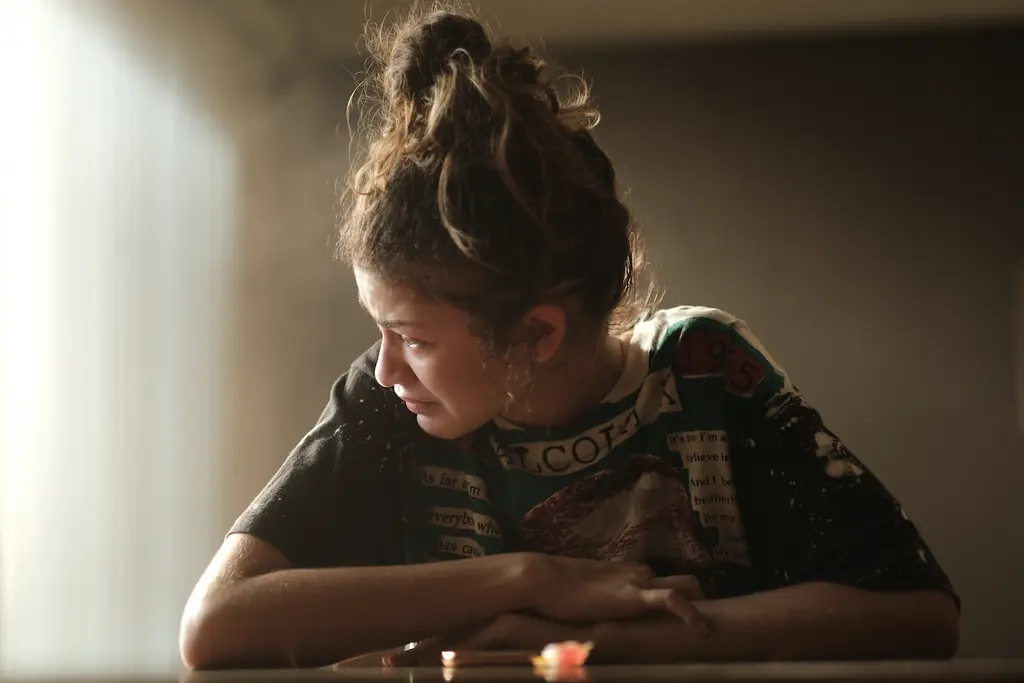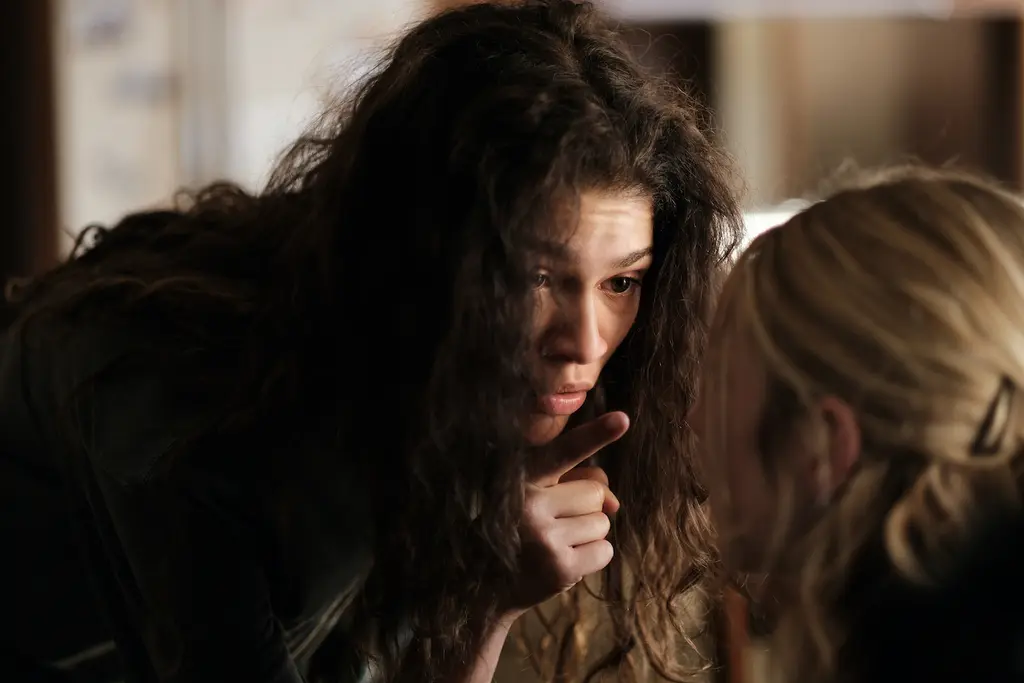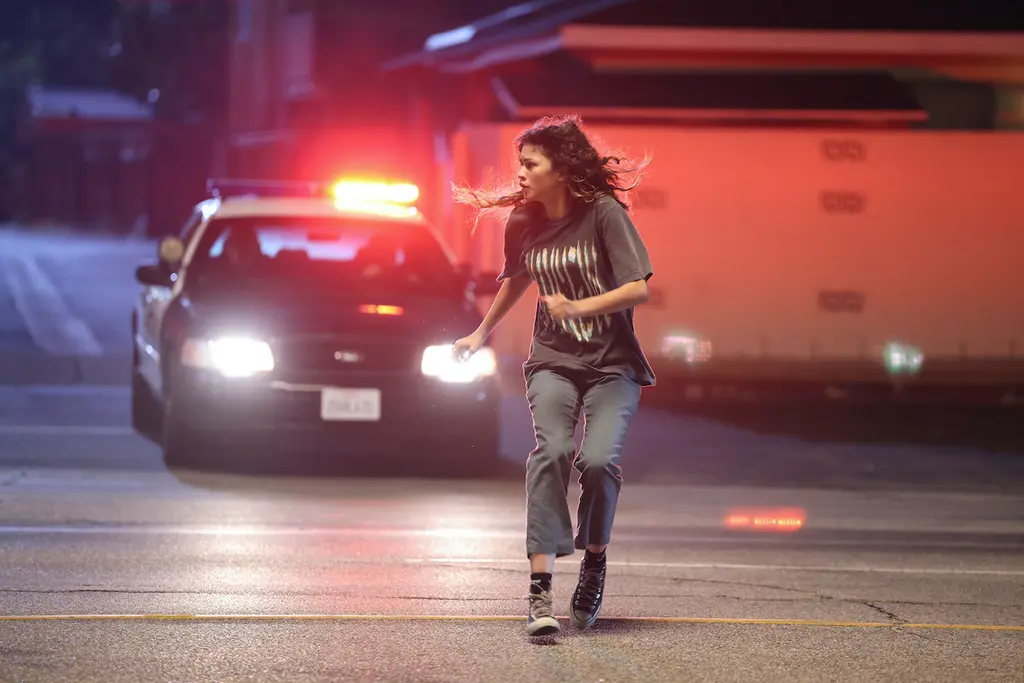Euphoria: hitting the show’s high (and low) notes with Labrinth

The Londoner is the soundtrack composer for Sam Levinson’s can’t-miss drama, embedded on the filmmakers’ set. As the series finale approaches, he gives us the scoop on making music with Zendaya.
Music
Words: Craig McLean
Euphoria series two: what a ride, right?
Sure, there have been issues: what happened to Kat’s storyline? Where did Demetrius Flenory Jr go after his brief appearance in episode one? Couldn’t we have had a flick more Ashtray? Are the rumours of onset upheaval true? And what about McKay, Cassie’s ex, ghosted by the show after a fleeting glimpse at that New Year’s party?
But despite all that, boy, has it delivered. The first episode that introduced Fezco’s badass grandma. The side-note detour into Nate’s dad’s backstory was riveting, even if it did feel a little tangential to the main action and cost us more screentime for, say, Jules. The Nate/Cassie/Maddy hate-triangle had viewers screaming. The Fexi courtship has been super-sweet. For the past six weeks, the HBO hit has been proper Appointment Telly.
Really, though, Euphoria is, once again, Zendaya’s series. Honing in on Rue’s addiction; the desperate depths to which it’s taken her, her sister and her mum; and the devastating family backstory that set the 17-year-old on the path to heroin-injecting despair – it’s all made for high-intensity, high-class drama that more than compensates for the nagging sense of shock-for-shock’s sake that crept into early episodes.
As Angus Cloud (Fezco) live-tweeted during the broadcast of episode five (The One With Rue Running For Her Life and Her Drugs): “GIVE ZENDAYA HER EMMY NOW”. That, of course, would be her second Euphoria Emmy.
Soundtracking all this have been musical choices as rich as the characterisation and storylines. The series’ ace needle-drops (vintage cuts like Gerry Rafferty’s Right Down The Line, The Notorious B.I.G.’s Hypnotize, DMX’s Party Up, and new tracks like Lana Del Rey’s Watercolor Eyes and (Pick Me Up) Euphoria by James Blake) are courtesy of music supervisor Jen Malone, who performed similar wonders on Yellowjackets. But it’s the show’s original score that fundamentally colours everything, beyond the icy blues and bruised purples of the cinematography.


That score – an electronic symphony that ranges from choral to hymnal to soulful – is entirely the work of Labrinth. London’s very own, Hackney’s finest, he’s been composing for showrunner Sam Levinson’s drama since day one. He writes to accompany specific scenes, characters, storylines or themes in the show, then finishes these musical moments into “records”, as he calls them, many of which (including Forever and Formula) have enjoyed a huge afterlife on streaming platforms and TikTok. He stretches out to other artists, too – that James Blake tune is a hook-up between the two Brits.
Labrinth has come a long way in the decade since he won the Song of the Year Brit Award for co-writing and producing Tinie Tempah’s 2010 banger Pass Out, and the release of his debut artist album Electronic Earth, which featured Beneath Your Beautiful, his chart-topping duet with Emeli Sandé.
The 33-year-old composer, singer, songwriter and producer is also part of electronic supergroup LSD with Sia and Diplo, and worked with Noah Cyrus on her first releases. Beyond that, Lab’s collab’d with North America’s premier a‑listers, including Rihanna, Kanye West, The Weeknd and Beyoncé – the latter on The Lion King soundtrack, which earned him Oscar, Grammy and Golden Globe nominations.
Then came his teaming up with Levinson and break into television work. In 2020, Labrinth’s music for the first series of Euphoria won an Ivor Novello Award (Best Television Soundtrack) and an Emmy, for Outstanding Original Music and Lyrics, for All For Us.
The latter was originally written for his second artist album, 2019’s Imagination & the Misfit Kid, then featured – and sung by Zendaya – in the first season finale.
Speaking of which… As we head into the last week of this series’ run, we spoke to Labrinth. He was packing up his Los Angeles studio – located on the lot where Euphoria is filmed – and preparing to head back to the UK. With only six more sleeps till the climactic eighth episode, we asked him: what’s the score with this rollercoaster season?
What was your brief in terms of scoring this week’s penultimate, stage musical episode (titled The Theatre and Its Double)?
Sam wanted to go in a film noir direction. I was like: “OK, cool.” However I can support it, I’ll do it. With the show, a lot of the musical choices are just Sam going, “let’s go in this direction”, and us helping him go in that direction. Usually he would want to funnel it through my head because he looks at me as like an Instagram filter [laughs]! So it’s a case of: “OK, let’s get film noir [music], but through Lab.” And sometimes some weird shit appears out of that, when I get inspired. With most of the [musical score on the show], Sam either goes record shopping through me, or he puts a sound or genre through me.
How many songs or pieces of music have you made for Euphoria, for both seasons and the two standalone specials?
Shit… Way more albums than I’ve released, definitely!
You landed this gig after Sam liked the, as you put it, “weirdness” in the music you were making for your album Imagination and the Misfit Kid. Can you unpack that for us? What did he hear in you that he liked?
One of the records that we used before [in the series] was Mount Everest, from that album. Mount Everest was [written] using trap influences, which was current music at the time. But then it was also using a swing that was from classic soul in the ’60s and ’50s, which is that Nina Simone, Ray Charles style. And then it was also using electronic music, mixed with hip-hop influences and Big Band influences.
So Sam’s wondering: “How the hell is this guy mixing all of these times and eras and genres in one piece of music?” And then also, the music wasn’t verse-chorus-verse-chorus. So for him, I wasn’t using the status quo, the traditional sequence that people use in pop music. I think he really enjoyed that it was very much freewheeling, sonically.
And then he also loved the record called Misbehaving that I did on the same album, which was mixed with so many different styles. So he just said: “I really think you could do music for film.” And he bet on me just based off of that, off of what he heard – and also maybe my ability to not be afraid to go into weird directions.


What is the creative process for you? Do you read a script and then write to that? Or are you writing to filmed images?
It’s both. Sometimes I get a specific cue – they’re like: “OK, we need a piece of music for this scene.” And they would send me a temp[orary] score, which is an idea of what I need to write. Usually, they have really amazing temp score music, so it fires me up. I’m like: “Fuck, it needs to be as good as this shit.” So that inspires me.
Then on the other hand, Sam really enjoys it when he just goes: “I need flippin’ Nine Inch Nails meets Tupac meets Kraftwerk, go.” And then I’m just like, OK, I’ve gotta try and figure out what that looks like.
Can you remember your first impression when you first read the Euphoria scripts?
I didn’t! Literally me and Sam just spoke about [the idea of]: what if Kanye produced a Danny Elfman [score] and then Lab just sang randomly in the middle of it? That’s literally it. From that conversation, I was like, OK, I’m inspired, let’s go. I started writing music from the get-go.
From the first series, Still Don’t Know My Name is easily the most played track on Spotify. What function did that song fulfil in the show? And why do you think it resonated so loudly?
Nobody gave a shit about Still Don’t Know My Name, honestly! Not that anybody hated the record or anything like that. But I remember I was saying [to the producers]: “Guys, the songs [in the show] might just become something. Kids might really like the songs. Shall I finish them?” Everyone’s like: “No, this is music for the show. Nobody cares about music for a show. It’s something that helps support the show.”
So I was like: “OK, cool, yeah, I’ll just give you what you need.” And then literally, 10 weeks later, kids just kept on just playing it and were like: “What the fuck is that song?” And then [the producers] were like: “Lab, do you think you can finish this song? Because it feels like it’s a hit.” And then we released it and people [used it on] Tik Tok, and they started using it everywhere. And that’s how it’s been with a lot of the records from the show.
The song was inspired by Kat, Barbie [Ferreira’s] character. I thought she was amazing. I liked that she was this kind of raging bull at home and just so dangerous. Then in school she was a nobody and nobody cared about her. I just thought: Still Don’t Know My Name.
The first track on the first soundtrack album is New Girl. Was that written for Jules, Hunter Schafer’s character?
Yeah. I just saw [the scene with] her riding the bike and liked that she was this magical character. I love that, especially in the first season, she felt magical and like a weird fairy. Is she even real? Is she supposed to be in this? So I wanted to write something that felt almost fantastical and euphoric. Almost drug-induced.
Can you tell us about filming your cameo (as a preacher who comforts Rue as he sings another new song, I’m Tired) in episode four of this series?
I just want to be famous! I just want someone to notice me, after writing Still Don’t Know My Name! Nah, I’m joking. One of our good friends, Adam Leber, who’s also my manager, said: “What do you think about Lab being in the show?” And they were like: “Fucking love it! Let’s find a space for him to perform.” Then Sam was like: “Lab, come on, man, let’s do it.” I hadn’t been on stage for a while, but they literally took me back to the place I first performed, which was my granddad’s church [in London]. So it was definitely nostalgic. It was a really lovely experience, though. Really, really spiritual
How did you find acting so intimately with Zendaya in that scene?
Me and Z get on really well. And me, Sam and Zendaya wrote I’m Tired together, so we have a really good creative bond. It felt like we were always supposed to work together. It was really easy, man. It just felt like I was hugging my sister.
“It’s all based off of Sam [Levinson’s] instincts. That’s why I think he’s really amazing and surprising and a bit unpredictable for a lot of people”
LABRINTH
It’s an important scene, because Rue is flashing back to her dad and his death, which was the catalyst for her eventual descent into drug addiction. How emotional was it on the set?
It was fucking emotional. Literally, the whole place was crying at the end. For me, I was halfway between “don’t fuck this up” and “you have to throw this down, this is a spiritual moment”. So I just zoned into the idea of somebody who was truthfully thinking: “Oh my God, how far have I fallen from grace?”
But before we even did that scene, we were writing I’m Tired. I came up with the melody because I wanted something that expresses this deep sadness. So I started a melody, and then Sam and Zendaya came into the studio, and I was like: “I’m trying to figure out the lyrics…” Then I started saying: “Hey, Lord, you know, I’m tired…” And then the pen started rolling.
The episode after that, Stand Still Like The Hummingbird, is the “Rue on the run” episode, which was very physically gruelling for Zendaya to film (“It was a very tough day,” she told Entertainment Weekly. “I beat myself up. I still have some scars on my legs and got quite a few bruises.”) How did you go about scoring an episode that’s all about desperation, action, terror, peril and stress?
I remember Hans Zimmer saying this: when you’re working with great editors and a great director, they know how to take what you’ve made and make it work, make it sing with a picture. So Julio [C. Perez IV, Euphoria’s editor] is very instrumental in editing pictures. So I wrote a record, Yeh I Fuckin’ Did It, which is a single that we put out.
The energy of that, it just felt like action, like somebody really running. Sam really felt the grit and the gnarliness of the record [matched] that action, so he really wanted to use it to do that. He was like: “Lab, I just need you to take it a bit further than where it is right now, to help the scene.” I really owe it to them for that.
Then, big gear change at the start of the episode after that (A Thousand Little Trees of Blood), which is Rue in withdrawal agony. The score is very sparse and minimal, with only faint synth stabs. What’s the music doing there?
It’s all based off of Sam’s instincts. That’s why I think he’s really amazing and surprising and a bit unpredictable for a lot of people. Because Sam is very instinctual. He’s like: “This one needs to be calm.” Or: “This one needs to be crazy.” While you’re going through this show, you’re literally going on Sam’s emotional journey. And so with episode six, he wanted to have a very sparse, film noir feel. You know how film noir [music] is – it’s one string line, and a lot of tension and a lot of silent moments.
“My studio on the lot became almost like a chill space. When all the cast were either tired or bored or ‘this is too much work’, they would just come over to the studio”
LABRINTH
Do you get the chance to – or do you need to – sit down with Zendaya and talk through what Rue is going through in an episode? Is that part of your creative process?
Yeah, especially for I’m Tired and a few of the [other] songs we were writing. She would come over to my studio. My studio on the lot became almost like a chill space. When all the cast were either tired or bored or [feeling like] “this is too much work”, they would just come over to the studio. They’d either sing something in the mic or just chill. And that’s what me and Z would do. We’d just chill and talk about how Rue’s doing this and we need to get a song that really expresses her sadness or whatever… We’d just go over stuff, so that was really inspiring and helpful.
Who’s your favourite character to write for and why?
I’ve not necessarily written for him loads, but I really love Ashtray [Javon “Wanna” Walton]. He’s just got a vibe – he just comes across so well. Angus [Cloud] as well – Fez is another amazing character. As amazing and cool as he is in the show, that’s the person that he is when you see him. I really enjoy the way Angus translates.
With regards to the finale, Zendaya recently said this: “The ending of the season was going to be very different. And then halfway through Sam and I were like: ‘We can’t just leave Rue here. We gotta put some fucking hope in this show.’” How did that change impact you?
Well, I had to get back in the studio! We all just sat down and worked it out. But it was a great idea. And that’s what’s great about this show: it feels like a live show. Even though it’s recorded, they’re putting their guts into it. They’re making new decisions as the show goes on. And there’s so many moving parts. It’s chaotic and it’s really intense to work with sometimes. But I think that’s what makes people love it: the surprise that the show gives and the gnarliness that you get from it.
“I’m literally just wrapping up the soundtrack album, which I’m mad excited about. That’s what you can expect at the end of the show”
LABRINTH
To go back to the start of your answer there, and bearing in mind what Zendaya said, had you written the score for the final episode as it was originally conceived? But then you had to go back and create something a bit more upbeat, hopeful?
Yeah. We [originally] wrote some stuff… [Then] I lost my hearing while working on the show and I had some personal family issues. That got me to a place where it was pretty difficult. And I had written some stuff for the end of the show. [But] it just felt like we wanted something like Z was saying – we needed hope. We all felt it.
So during this time, it gave us time to think about what we want to say at the end and how we want to go out with the [last episode of the] show. And so when Zendaya and Sam came with the idea, I was like: “This feels absolutely right – I’m coming to the studio now.” I was done working then – I was like, “I need to stop.” But that idea just made absolute sense.
What can we expect from the finale?
Nothing! No, I’m joking. From the finale? Man, you guys gotta wait!
Will we be in tears?
Ha! I hope so. That’s not a good thing to wish on someone. But I guess if it’s tears of joy, then I wish that on all of them.
And are you finally finished on the score composition and songwriting?
I’m literally in this studio, just wrapping up the soundtrack album, which I’m mad excited about. That’s what you can expect at the end of the show.
How do you make that work as an album, as a body of work?
What a lot of people don’t know is there’s actually a lot of songs in the show. I feel like the show’s been an Easter Egg for a lot of the songs that they’re going to hear on the soundtrack [album]. So I’m just excited. It feels like a really exciting album that I’m really stoked to release.
Have you started thinking about series three yet?
Um, no. I want some sleep, man! It’s been a hard one.
The final episode of Euphoria airs on Sky and NOW TV on Sunday 27th February. The series two soundtrack album will be released on 25th February. Labrinth’s series two Original Score album will also be released… sometime around then





